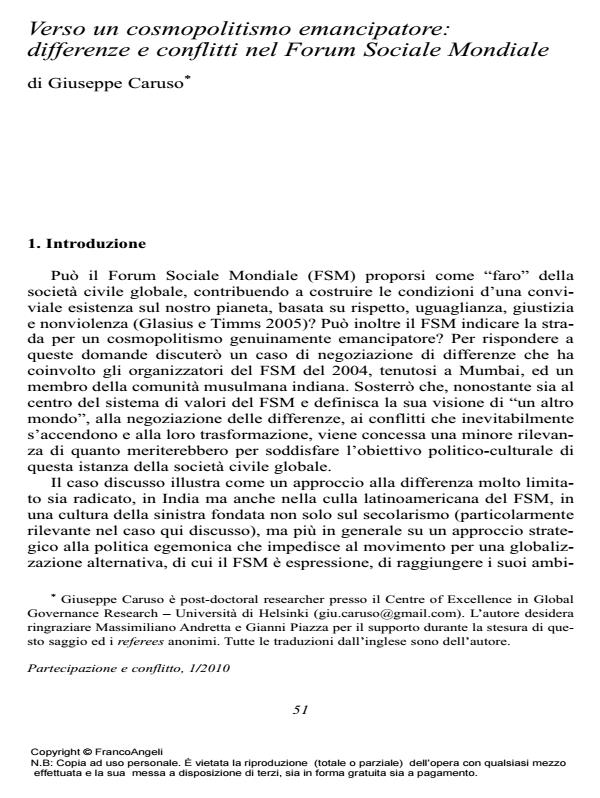Verso un cosmopolitismo emancipatore: differenze e conflitti nel Forum Sociale Mondiale
Titolo Rivista PARTECIPAZIONE E CONFLITTO
Autori/Curatori Giuseppe Caruso
Anno di pubblicazione 2010 Fascicolo 2010/1
Lingua Italiano Numero pagine 28 P. 51-78 Dimensione file 374 KB
DOI 10.3280/PACO2010-001003
Il DOI è il codice a barre della proprietà intellettuale: per saperne di più
clicca qui
Qui sotto puoi vedere in anteprima la prima pagina di questo articolo.
Se questo articolo ti interessa, lo puoi acquistare (e scaricare in formato pdf) seguendo le facili indicazioni per acquistare il download credit. Acquista Download Credits per scaricare questo Articolo in formato PDF

FrancoAngeli è membro della Publishers International Linking Association, Inc (PILA)associazione indipendente e non profit per facilitare (attraverso i servizi tecnologici implementati da CrossRef.org) l’accesso degli studiosi ai contenuti digitali nelle pubblicazioni professionali e scientifiche
Towards an Emancipatory Cosmopolitanism. Differences and Conflicts in the World Social Forum - Can global civil society contribute to a genuinely emancipator cosmopolitanism? Is the World Social Forum a site for creating the conditions of a global convivial existence, based on equality, justice, and non-violence? Its Charter states that the WSF is "a forum open to pluralism and to (...) diversity of genders, ethnicities, cultures, generations and physical capacities". This statement acknowledges variation within the WSF but remains silent about power and structural imbalances within it. Later, in the practice of the WSF the word "difference", recognition of the political implications of variance, replaced "diversity". However, the consciousness of the need for transformative political action to engage the full potential of difference is not fully fulfilled. Instead, the approach to mediation, articulation, and management of differences in the WSF is often politically inconsistent with the Forum’s principles. While difference in unity is one of the slogans of the Forum, the unity is often produced as a form of generic "activist" cosmopolitanism that everyone should be able to understand and fit into comfortably. Whereas at time strategically successful, the reduction of cosmopolitanism to the lowest common denominator between world cultures and specific normative thrusts, may prove counterproductive unless it engages in transformative processes. This article discusses conflict management and transformation in the WSF on the basis of extensive fieldwork material. The case study offers the opportunity to discuss three approaches to conflict mediation: incommensurable, hegemonic and transformative. The evidence presented brings us to conclude that transformative conflict mediation while proved to be more successful in the context discussed is also more consistent with the vision of the WSF.
Parole chiave:Hegemony, Conflict Management, World Social Forum, Cosmopolitanism, Differences Management, Incommensurability.
Giuseppe Caruso, Verso un cosmopolitismo emancipatore: differenze e conflitti nel Forum Sociale Mondiale in "PARTECIPAZIONE E CONFLITTO" 1/2010, pp 51-78, DOI: 10.3280/PACO2010-001003